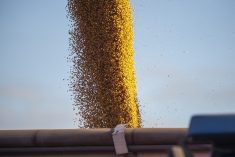Canada already has limited access for boneless beef
Beijing/Chicago | Reuters / China and the United States have made progress toward reaching a deal on American beef exports, but agreement on technical issues is still needed before final approval, China’s vice agriculture minister, Niu Dun, said Friday.
China has restricted imports of American beef for 10 years following the first reported U.S. case, in December 2003, of bovine spongiform encephalopathy (BSE) in a domestic animal.
The U.S., the world’s fourth-largest beef exporter, is keen to tap rapidly growing demand in China being fuelled by rising incomes and a shortage of domestic supply.
Read Also

U.S. livestock: Cattle futures come down from highs
Cattle futures on the Chicago Mercantile Exchange were weaker on Monday, coming down from recent highs.
“We’ve made progress on many areas,” Niu told reporters following discussions on beef exports during this week’s Joint Commission on Commerce and Trade (JCCT) talks.
He added that agreement was still needed on issues including the range of products to be approved as well as safety and traceability.
“We hope both sides can reach agreement next July,” Niu said.
Australia is currently China’s top beef supplier, and has reaped the benefits of fast-growing demand. An Australian government body this month forecast that the country is set to ship 160,000 tonnes of beef and veal to the Chinese market in the 2013-14 year, up 74 per cent on the previous year.
China also allows beef imports from New Zealand, Argentina, Uruguay and Costa Rica.
As of December 2012, seven Canadian packing plants were approved to export beef to China: three each in Ontario and Alberta and one in Quebec.
China — which shut its ports to Canadian beef after Canada found its first domestic case of BSE in 2003 — reopened in 2011 to Canadian boneless beef, from cattle under 30 months of age, processed at approved plants.
Significant quantities of U.S. beef are also smuggled into China, through Hong Kong.
“The U.S. industry looks forward to receiving more details about today’s discussions between our two governments,” said Michael Pareles, a spokesman at the U.S. Meat Export Federation’s Beijing office.
Rich Nelson, chief strategist with Allendale Inc. in McHenry, Ill., called Friday’s news encouraging for U.S. beef, but said further talks with China, possibly another one or two months, may be needed before any positive results can be realized.
“It’s good to see and good to hear. But, a lot of our beef is already going to China through Hong Kong, which means there may not be a huge groundswell of beef demand coming directly from the Chinese if we get this agreement made,” Nelson said.
Chicago-based Oak Investment Group president and live cattle futures trader Joe Ocrant said: “It would mean a lot to U.S. beef exporters in the long term because you have a growing middle class in China and they will become beef eaters. As far as the short term, it doesn’t mean much.”
— Reporting for Reuters by Sui-Lee Wee, with additional reporting by Theopolis Waters in Chicago. Includes files from AGCanada.com Network staff.



















